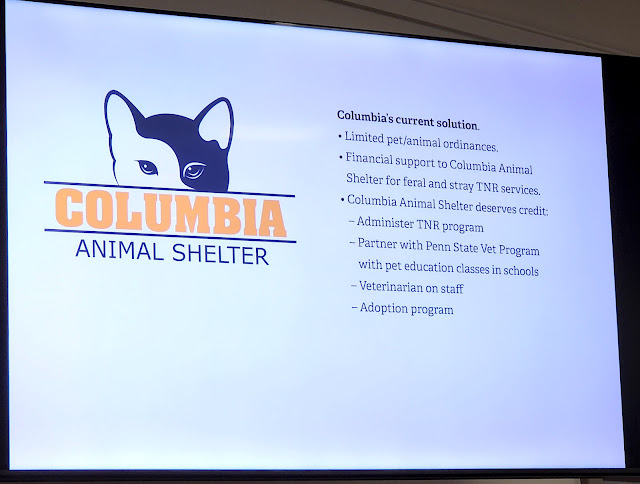Feral cats on the 100 block of Locust Street in 2018
"It's not the feral cat's fault it's feral. It's people's fault," Burgard said. "People let cats free or are perpetuating the problem by feeding them." He added that ferals can spread disease, damage property, and kill wildlife. Lintner said she has received complaints about ferals from residents in different areas of town.
Burgard noted that cats can be categorized as follows:
- Domestic - adapted from wild or natural state, social with humans
- Stray - was an indoor cat that got out or was let out and abandoned
- Feral - unsocialized outdoor cat, little or no contact with humans
A healthy reproducing pair of cats can produce over 11 million offspring in 9 years.
Burgard cited a study stating that, under ideal conditions, a healthy reproducing pair of cats can ultimately produce over 11 million offspring in 9 years. (See graphic above.) 70% of a feral cat population must be spayed and neutered before the population will begin to decline. For Columbia, that means 700 ferals must be "fixed." Unfortunately, the current number is only 100, or 10%, although Columbia is above the national average of 2.3%.
During the hour-long discussion, officials offered several ideas to address the problem:
Lintner noted that none of the solutions will fix the problem overnight, saying, "It's going to take a long, long time."
During the hour-long discussion, officials offered several ideas to address the problem:
- Continue the TNR program with the Columbia Animal Shelter. (TNR stands for "Trap, Neuter, Return." The borough offers financial support with the Columbia Animal Shelter.)
- Enact stronger ordinances to manage feral cat populations
- Enact stronger ordinances to protect domestic cats and encourage proper ownership
- Support volunteers
- Volunteer support for and promotion of Columbia Animal Shelter
- Use aggressive fertility control
- Hire an animal control person or contracted service
- Purchase and use more traps
Lintner noted that none of the solutions will fix the problem overnight, saying, "It's going to take a long, long time."
The Columbia Animal Shelter offers TNR services.



No comments:
Post a Comment
Note: Only a member of this blog may post a comment.